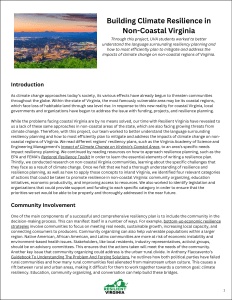 As climate change approaches today’s society, its various effects have already begun to threaten communities throughout the globe. Within the state of Virginia, the most famously vulnerable area may be its coastal regions, which face loss of habitable land through sea level rise. In response to this new reality for coastal Virginia, local governments and organizations have begun to address the issue with funding, projects, and resilience planning.
As climate change approaches today’s society, its various effects have already begun to threaten communities throughout the globe. Within the state of Virginia, the most famously vulnerable area may be its coastal regions, which face loss of habitable land through sea level rise. In response to this new reality for coastal Virginia, local governments and organizations have begun to address the issue with funding, projects, and resilience planning.
While the problems facing coastal Virginia are by no means solved, there is a lack of these same approaches in non-coastal areas of the state. This report identifies four relevant categories of actions that could be taken to promote resilience in non-coastal Virginia: community organizing, education initiatives, economic productivity, and improving access to resources.




